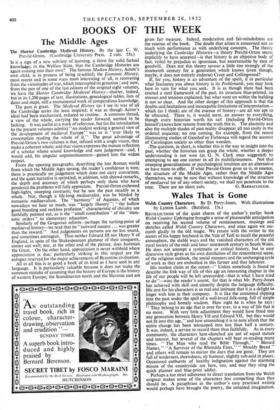BOOKS OF THE WEEK The Middle Ages The Shorter Cambridge
Medieval History. By the late C. W. Previte-Orton. (Cambridge University Press. 2 vols. 55s.) Is it a sign of a new sobriety of learning, a thirst for solid factual knowledge, in the Welfare State, that the Cambridge Histories are again coming into their own? The famous Modern History, Acton's own child, is in process of being re-edited; the Economic History, most recent and in some ways most interesting of all, is recovering from the vicissitudes of war, which interrupted its gestation ; and now, from the pen of one of the last editors of the original eight volumes, we have the Shorter Cambridge Medieval History—shorter, indeed, but in its 1,200 pages of text, illustrations, genealogical tables, lists of dates and maps, still a monumental work of compendious knowledge. The gain is great. The Medieval History (as I see it) was of all the Cambridge series the least inspired; it was as though Acton's ideal had been mechanised, reduced to routine. A common thread, a view of the whole, carrying the reader forward, seemed to be lacking. It was useful as a work of reference, but (as the introduction to the present volumes admits) "no student seeking a general view of the development of medieval Europe" was or is "ever likely to contemplate reading the whole of it." The great .advantage of Previte-Orton's two volumes is that, infused with a single vision, they make a coherent whole; and that vision expresses the mature reflection of a scholar whose sound knowledge and sure judgement—and, I would add, his singular unpretentiousness—gained him the widest respect. From the opening paragraphs, describing the late Roman world from which the Middle Ages sprang, the reader's confidence is won; there is practically no judgement which does not carry conviction; and the quiet narrative is sprinkled, in addition, with shrewd remarks,. the depth and accuracy of which perhaps only those who have pondered the problems will fully appreciate. Previte-Orton eschewed high-lights, sweeping contrasts; but he saw the past steadily as a whole. Nor, though a life-long mediaevalist, was he -blinded by romantic mediaevalism. The "harmony" of Aquinas, of which nowadays we hear so much, was "largely illusory"; "the hollow good breeding and reckless profusion" characteristic of chivalry are faithfully pointed out, as is the "small contribution" of the "mon- astic orders" to elementary education. Similarly of the Gregorian reform—perhaps the turning-point of mediaeval history—we read that its "outward success . .. was greater than the inward." And judgements on persons are no less sound, and sometimes astringent. Thus neither Edward III nor Henry V of England, in spite of the Shakespearean glamour of their conquests, comes out well; nor, at the other end of the picture, does Justinian the Great. On the other hand, appreciation is never withheld where appreciation is due; particularly striking in this respect are the eulogies reserved for the major achievements of Byzantine civilisation. All in all this is as good a book of its kind as I have seen in any language. It is particularly valuable because it does not make the common mistake of assuming that the history of Europe is the history of western Europe; the Scandinavian north and the Slavonic east are given fair measure. Indeed, moderation and fair-mindedness are the essence of the book. The doubt that arises is concerned not so much with performance as with underlying concepts. The theory underlying the Cambridge Histories—a theory Previte-Orton seems implicitly to have accepted—is that history is an objective body of fact, veiled by prejudice or ignorance, but ascertainable by men of goodwill. Does not this theory savour a little too strongly of the nineteenth century for a. generation which knows (even though, maybe, it does not entirely endorse) Croce and Collingwood? If, for you, history is an adventure of the spirit, if in particular what fascinates you about history is its Problematik, you may look here in vain for what you seek. It is as though there had been erected a steel framework of the past, its structure blue-printed, its stresses and tensions explained; but what went on within the building is not so clear. And the other danger of this approach is that the doubts and hesitations and inescapable limitations of interpretation— which (as I think) are of the essence of history—are all too apt to be obscured. There is, it would seem, an answer to everything, though every historian worth his salt (including Previte-Orton himself) knows how remote from the truth this is. The plasticity and also the multiple shades of past reality disappear all too easily in the ordered sequence; no one coming, for example, from the recent illuminating studies of Ganshof or Fichtenau will regard the account of Carolingian society as other than wooden.
-.The question, in short, is whether this is the way to insight into the past, whether the historian can grasp the whole, whether a deeper understanding is not won (as G. N. Clark once suggested) by attempting to see one corner in all its multifariousness. Not that sweeping generalisations or psychological intuition are an alternative or have more to offer. If what Previte-Orton gives us is, in essence, the structure of the Middle Ages, rather than the Middle Ages themselves, we may be sure that without knowledge of the structure of mediaeval (or of any other) society, we shall not penetrate to the


































 Previous page
Previous page